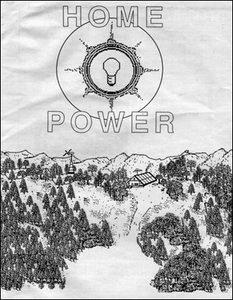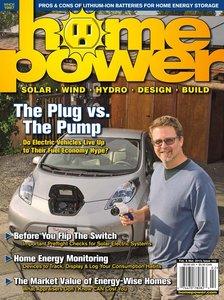“By the way, if you want to have a war over oil, leave me
out of it- because I don’t think we need it. All I have to say is, go
solar! Go wind! Let a little freedom into your life, and help your
neighbors stay free, too.”
Richard Perez, Publisher, Home Power Magazine- keynote address, I-Renew Energy Expo, Sept.8, 2001
 |
| Home Power #1: 1987 |
Just
three days before the terrorist attacks that rocked the nation, Richard
Perez, the publisher of the independent renewable energy publication
Home Power
addressed a packed audience at one of the nations oldest gatherings of
wind and solar power enthusiasts. He inspired the audience with a talk
about the importance of freedom. Freedom to make one’s own choices, and
accepting the responsibilities that come with that freedom.
It has been more than 13 years since Perez gave that speech and the
solar landscape has changed immensely. Solar is no longer primarily the
purview of off-grid survivalists and back-to-the-land hippies. The
installed price of solar has dropped from above $10 per watt to under
$4. More states around the nation are encouraging solar development, and
the economic benefits of solar are becoming more obvious by the day.
And yet, there remains a strong anti-solar contingent in the United
States. But why? In post-911 America, isn’t freedom still an American
value?
 |
| Home Power: Today |
Many will point out the obvious political divide between liberals and
conservatives, or Democrats and Republicans, but on closer examination,
this separation is relatively superficial in the debate over solar
values. Despite the perception that using solar energy to generate power
is a “left-coast liberal” idea, using renewable energy sources like
wind and solar has long been favored by many extremely conservative
individuals. The motivations for using solar may be different for
liberals and conservatives, but historically, there has been plenty of
interest on both ends of the political spectrum.
Unfortunately for energy consumers (and that includes just about
everyone in America) solar has become a strawman for both of Americas
big political parties. Before the advent of major debate over climate
change in congress, the debate centered simply around how new
technologies would mature in this country. “Mandates” or the “free
market?” This was the crux of the argument as we entered the 21st
century. Now, anti-climate legislation activists paint solar as part of a
scheme to raise taxes, while pro-climate legislation activists paint
opponents of solar as “anti-science” or the “tools of the oil industry.”
In most cases, both parties are arguing points that are peripheral to
the central issue: the inevitable move away from the 19th century
central station generation model toward a more distributed generation
model.
Read More



No comments:
Post a Comment